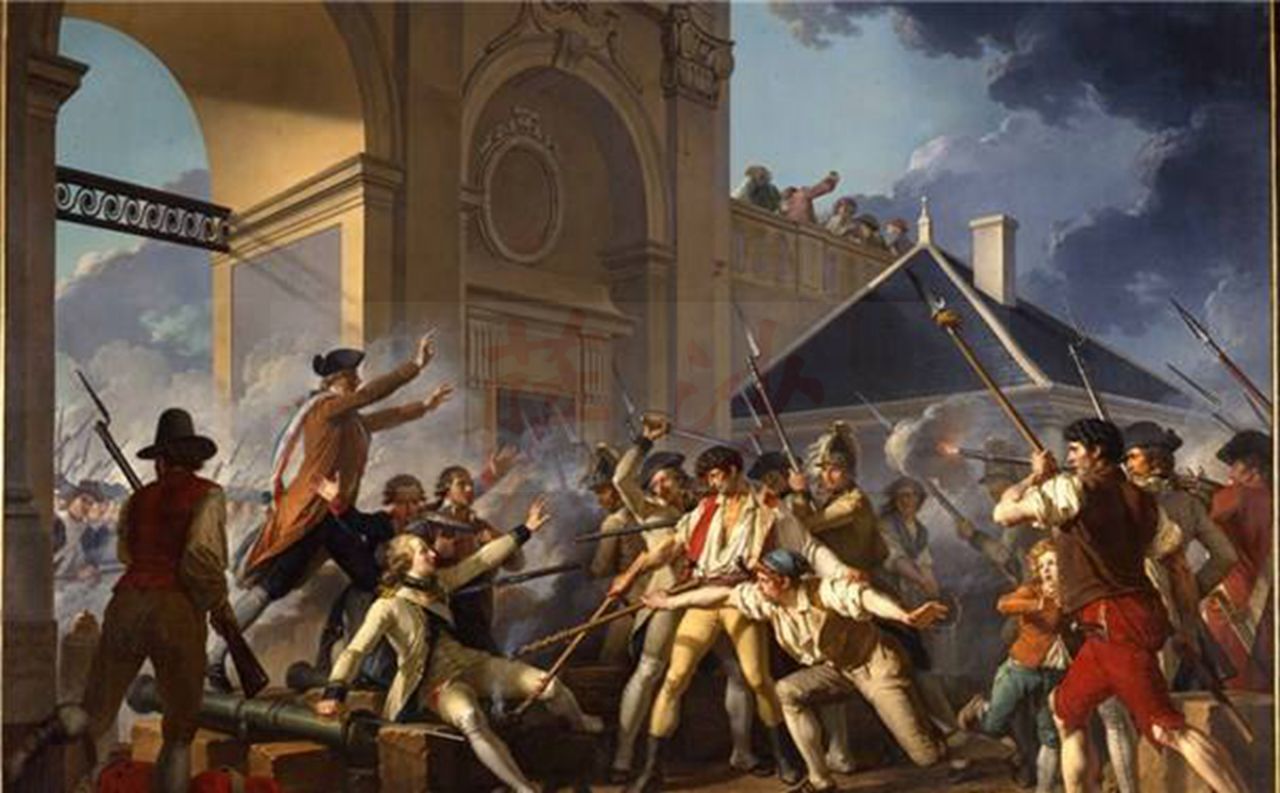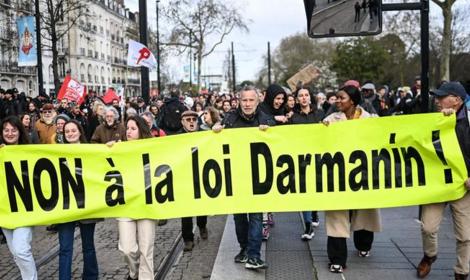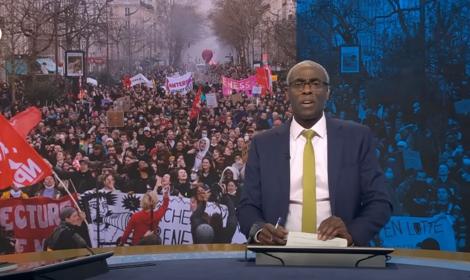法国大革命后的法国是什么样的政府?(一)
正文翻译

What type of government was France after the French Revolution?
法国大革命后的法国是什么样的政府?

What type of government was France after the French Revolution?
法国大革命后的法国是什么样的政府?
评论翻译
elisheva
How does modern France view the French Revolution?
Hey ! I’m a French person, so I think I can give you both a personal and a more general point of view on the French Revolution.
Most of the French don’t really mind the French Revolution, but are glad it happened. When we talk about the French Revolution we think “overthrowing the monarchy” and not really the reign of Terror.
But when we do talk about the reign of Terror, most of the people think of an era in which “evil, blood-thirsty” Robespierre became an awful dictator
Yes, unfortunately, the post-thermidor propaganda is deeply ingrained in our culture and minds. We are taught in school that the French Revolution was a good thing until 1793, where it became wicked and how all the “good guys” died (Danton, Desmoulins) at the hands of the “evil” Robespierre. The reign of Terror is treated the way we learn about dictatorships, without nuances at first, but if you follow more specific History studies, then (some) professors might add nuances to it. But generally speaking, we appreaciate the overthrowing of monarchy, but not what ensued of it.
现代法国如何看待法国大革命?
嘿,我是法国人,所以我想我可以给你一个关于法国大革命的个人观点和更普遍的观点。
大多数法国人并不介意法国大革命,对它的发生反而很高兴。当我们谈论法国大革命时,我们想到的是“推翻君主制”,而不是真正的恐怖统治。
但当我们谈论恐怖统治时,大多数人想到的是一个“邪恶、嗜血”的罗伯斯庇尔成为可怕独裁者的时代。
不幸的是,热月政变后的宣传在我们的文化和思想中根深蒂固。我们在学校里被教导,法国大革命是一件好事,直到1793年,它变得邪恶,所有的“好人”(丹东,德穆兰)都死在了“邪恶的”罗伯斯庇尔手中。恐怖统治的处理方式与我们了解独裁统治的方式相同,一开始没有细微差别,但如果你关注更具体的历史研究,那么(一些)教授可能会增加细微差别。但总的来说,我们欣赏推翻君主制,但不欣赏随之而来的一切。
尽管大多数人认为罗伯斯庇尔是个坏人,但今天我们有了所谓的“罗伯斯庇尔主义者”,他们更同情罗伯斯庇尔。
Although most people believe Robespierre was a bad guy, today we have what we call “roberpierristes” who are more sympathetic to him.
And despite a majority being happy without a king, we still have royalists (royalistes in French) who are politically active today !
In French schools, we usually don’t evoke the reign of Terror that much when introduced to the French Revolution, but as we grow older, they teach us that the reign of Terror was a really bad thing and that everyone lived in fear (which is not true, even if the context was extremely tense). We really are taught the details of the Revolution because even now, some characters/events are subject to controversy and some are even totally unknown to us.
The French Revolution was an important part of our History that we are proud of, even if we don’t glamorize the reign of Terror.
French Revolution rhythms with Freedom, Equality and Fraternity for us, with rights, new living conditions. And although it is not essentially true, it is still the heritage we believe we had from that period.
And I have to say that the view on the French Revolution also depends on where you are in France. In vendée for example, people usually associate the FR with the terrible massacres that happened here. Vendéens are still renowned to be royalists, even now haha.
As for me, and for studying relentlessly the French Revolution for more than two years, I can assure you that the French Revolution is a complexe, complicated mess. It is more than just pissed French people killing the King and falling into a dictatorship. ;)
尽管大多数人对没有国王一事感到高兴,但我们仍然有保皇党,他们今天在政治上很活跃!
在法国的学校里,当我们被介绍到法国大革命时,我们通常不会那么多地想起恐怖统治,但随着年龄的增长,他们告诉我们恐怖统治是一件非常糟糕的事情,每个人都生活在恐惧中(这不是真的,即使环境非常紧张)。我们真的了解到了革命的细节,因为即使是现在,一些人物/事件也会受到争议,有些甚至是我们完全不知道的。
法国大革命是我们历史的重要组成部分,我们对此感到自豪,甚至我们没有美化恐怖统治。
法国大革命为我们带来了自由、平等和博爱,以及权利和新的生活条件。尽管这基本上不是真的,我们相信这是我们从那个时期继承下来的遗产
我不得不说,对法国大革命的看法也取决于你在法国的哪个地方。例如,在旺代,人们通常把法国大革命与发生在这里的可怕的大屠杀联系在一起。即使是现在旺代仍然以保皇党而闻名,哈哈。
至于我,由于我在两年多的时间里孜孜不倦地研究法国大革命,我可以向你们保证,法国大革命是一个复杂的混乱局势。这可不仅仅是愤怒的法国人杀死国王,陷入独裁统治。
Jeremie Le Guen
Why did the French Revolution not produce a similar government to the one that followed it?
One major reason for the French Revolution was that the so-called government before it was, well, not a government.
Officially, there were three Estates (let's call them political parties): the First Estate was the French Catholic Church, represented by clergymen. The Second Estate was the Aristocracy, represented by wealthy landowners, literally born into their position. The Third Estate was everybody else, but mostly represented by the Bourgeoisie (wealthy commoners).
What was the flaw in this system of government? Well, it was a three-way party system when it came to votes, and the Church and the Aristocracy ALWAYS voted together, so it was always 2 to 1. It was such a useless system that it was hardly ever used as a system of government at all, and the King, the highest-ranking Aristocrat, and legally appointed by God, basically ruled unopposed.
Now it turns out that millions of French people eventually got really angry about this whole set-up. But to reply to this question, the reason why the French revolutionary government didn't go for a similar one that existed before, is because it was the worse kind of system of government that they could think of, and they did try some pretty bad ones.
But nobody in their right mind wanted some stupid self-proclaimed God-ordained King as a leader.
为什么法国大革命没有产生一个与它之后的政府相似的政府?
法国大革命爆发的一个主要原因是,它之前的所谓政府其实不是政府。
官方上有三个阶层(我们称之为政党):第一阶层是法国天主教会,由神职人员代表。第二阶层是贵族阶层,以富有的地主为代表,他们生来就有这个地位。第三阶层是其他所有人,但主要由资产阶级(富裕的平民)代表。
这个政府体系的缺陷是什么?嗯,在投票方面,这是一个三方制,教会和贵族总是一起投票,所以总是2比1。这是一个如此无用的制度,以至于它几乎从未被用作政府制度,而国王是最高等级的贵族,由“上帝”合法任命,基本上无人反对。
现在,事实证明,无数法国人最终对这一切感到非常愤怒。但为了回答这个问题,法国革命政府之所以没有采用以前存在的类似政府体系,是因为这是他们能想到的最糟糕的政府体系,他们确实尝试过一些非常糟糕的制度。
但是没有一个头脑正常的人愿意让一个愚蠢的自封的上帝任命的国王做领袖。
David Dineen-Porter
How successful was the French Revolution?
I’ve read the other two answers and I think they get a lot of stuff wrong. A lot of stuff right, but a lot wrong. The French Revolution transformed France massively, suddenly, and unexpectedly. In terms of successs, the French revolution was not an immediate success, but its long term impact was that it mostly achieved its general aim of establishing a republic with citizen’s rights, universal suffrage, a representative assembly based on secular and not religious ideas.
The aftermath of the French revolution was the re-establishment of monarchy, but the revolution, which established the first democracy of the modern age, acted as an ideological signpost pointed to by reformers in every successive generation. The fact that they succeeded in overthrowing the landed aristocracy and then later the monarchy, and established a republic with universal (male) suffrage meant that they could do it again. it was possible. The genie was out of the bottle.
Keep in mind that before the French revolution, the landed aristocracy had virtually no political power. The Bourbon monarchs had gradually centralized the government and wrested prerogatives away from the nobility, leaving a class of more or less vestigial billionaires who had huge wealth and no responsibility. The revolution was against them, not against the monarch. In fact, the Revolution initially established a constitutional Monarchy like the one in the UK. French Revolutionary thinkers often pointed to Britain’s constitutional Monarchy as an inspiration. It was only after Louis attempted to flee and raise an army to overthrow the revolutionary government that the radical republicans took over the revolution.
法国大革命有多成功?
我已经阅读了另外两个答案,我认为他们很多地方说错了。很多东西是对的,但也有很多是错的。法国法国大革命彻底、突然、出乎意料地改变了法国。就成功而言,法国革命并没有立即取得成功,但其长期影响是,它基本上实现了建立一个拥有公民权利、普选权、基于世俗而非宗教思想的代议制的共和国的总体目标。
法国革命带来的是重新建立了君主制,但建立了现代第一个民主制度的革命,成为了每一代改革者所指向的意识形态路标。事实上,他们成功地推翻了土地贵族和后来的君主制,并建立了一个具有普遍(男性)选举权的共和国,这意味着他们可以再次做到这一点。这是可能的。精灵从瓶子里出来了。
请记住,在法国革命之前,土地贵族几乎没有政治权力。波旁王朝的君主们逐渐将政府集中起来,并从贵族手中夺取特权,留下了一批或多或少的亿万富翁,他们拥有巨额财富,却毫无责任感。革命是反对他们的,不是反对君主的。事实上,革命最初建立了一个像英国一样的君主立宪制。法国革命思想家经常以英国君主立宪制为灵感。直到路易企图逃跑并组建军队推翻革命政府后,激进的共和派才接管了革命。
The key goal of the revolution, to take wealth out of the hands of irresponsible people who had inherited it, and to use that wealth for the good of the poor, was accomplished pretty quickly. France today, like most capitalist countries, has its own class of millionaires and billionaires, but they aren’t above the law. Also, French citizens have rights, numerous social benefits based on a fairer distribution of the nation’s wealth, universal education, healthcare, etc. etc. etc. These are all extensions of the original revolutionary principles.
France, as the first modern democracy, also established a pattern that other countries looked to. Americans used revolutionary france as an example. The American revolution more or less was a coup, rather than a revolution. Rich men in America replaced Rich men in england as masters of the continent. But reformers in the USA looked at the revolutionary republic as a model for how America might increase political participation. At the same time, conservative and wealthy elements in the US pointed ot the same government as a reason why poor people could not be trusted. Poor people, they argued, were bloodthirsty savages.
France’s example formed the basis for republics throughout Europe that were established following the abolition of monarchies over the intervening 200 years. The 2nd republic and 3rd repuiblic remained stalwart examples of the fact that it COULD be done.
Anyhow, the revolution was immediately successful in that it killed off the heredtary billionaire class in one fell swoop. Heads rolled and the parasites who leeched of society and contributed nothing were devoured by the poor. An example we should all follow.
革命的关键目标,即从继承财富的不负责任的人手中夺走财富,并利用这些财富为穷人造福——很快就实现了。今天的法国,和大多数资本主义国家一样,有自己的百万富翁和亿万富翁阶层,但他们并不凌驾于法律之上。此外,法国公民有权利,在更公平分配国家财富的基础上获得许多社会福利,普及教育、医疗保健等。这些都是原有革命原则的延伸。
法国作为第一个现代民主国家,也建立了一种其他国家都在学习的模式。美国人以法国革命为例。美国革命或多或少是一场政变,而不是革命。美国的富人取代了英国的富人成为欧洲大陆的主人。但美国的改革家将革命共和国视为美国如何提高政治参与度的典范。与此同时,美国的保守派和富人指出,同一个政府是认为穷人不可信的原因。政府认为,穷人是嗜血的野蛮人。
法国的例子为整个欧洲在废除君主制后的200年建立的共和国奠定了基础。第二共和国和第三共和国仍然坚定地证明了这是可以做到的。
不管怎样,这场革命立即取得了成功,因为它一举消灭了世袭的亿万富翁阶层。人头滚滚,寄生在社会上的寄生虫被穷人吞噬。我们都应该效仿。
Ousmane KINDA
After the French Revolution, France experienced several types of government that evolved over time.
Initially, the Revolution led to the abolition of the monarchy and the proclamation of the First Republic in 1792. This government was led by an elected National Convention and had a constitution that established universal male suffrage, but was also marked by strong political instability and internal conflicts.
In 1799, Napoleon Bonaparte overthrew the Republic government and took power as First Consul, establishing the Consulate. In 1804, he crowned himself Emperor and founded the First French Empire, characterized by an authoritarian and centralized system.
After Napoleon's fall in 1814, the monarchy was restored with Louis XVIII as king. However, this restoration was short-lived, as in 1830 a new revolution erupted and led to the advent of Louis-Philippe I, who established a constitutional and parliamentary monarchy known as the July Monarchy.
In 1848, a new revolution took place, this time with the proclamation of the Second Republic, which lasted until 1852. However, this period was characterized by intense political struggles, economic instability, and violent repression of some social revolts, such as the one in June 1848 in Paris.
Finally, in 1870, the Third Republic was proclaimed after France's defeat in the Franco-Prussian War. This republic was the most enduring and lasted until World War II, even though it was marked by significant political and social crises, including the Dreyfus Affair and the rise of the far-right in the 1930s.
法国大革命后,法国经历了几种类型的政府,随着时间的推移而演变。
最初,革命导致废除君主制,并于1792年宣布成立第一共和国。本届政府由民选国民大会领导,宪法规定了男性普选权,但也存在着强烈的政治不稳定和内部冲突。
1799年,拿破仑·波拿巴推翻了共和国政府,并以第一领事的身份掌权,建立了领事馆。1804年,他加冕为皇帝,建立了以独裁和中央集权制度为特征的第一法兰西帝国。
1814年拿破仑倒台后,君主制得以恢复,路易十八成为国王。然而,这种恢复是短暂的,因为1830年爆发了一场新的革命,并导致了路易·菲利普一世的出现,他建立了一个被称为七月君主制的宪法和议会君主制。
1848年,一场新的革命发生了,这一次是第二共和国的宣布,一直持续到1852年。然而,这一时期的特点是激烈的政治斗争、经济不稳定和对一些社会起义的暴力镇压,例如1848年6月在巴黎发生的起义。
最后,在1870年,法国在普法战争中战败后,第三共和国宣告成立。这个共和国是最持久的,一直持续到第二次世界大战,尽管它经历了重大的政治和社会危机,包括德雷福斯事件和20世纪30年代极右翼的崛起。
Tonios Kaleem
There are several major causes of the French Revolution.
First was the financial crisis France was facing. France was actually a very wealthy and powerful nation in the late 18th century, but the French Crown (aka the Government) was in serious debt (sound familiar?). The reason for this debt was because France spent lots of money on the Seven Years War and the American Revolution, and because how France collected taxes (more on that later)
Second, France suffered a serious of famines in 1788 and 1789 that resulted in bread riots across the nation.
Third was the spread of the Enlightenment that bred ideas such as separation of powers and freedom of speech and press. When the Revolution started, few in France actually advocated for republicanism. That came later. Until 1793, most people in France (including people like Jean-Paul Marat) were monarchists.
法国大革命有几个主要原因。
首先是法国面临的金融危机。事实上,在18世纪末,法国是一个非常富裕和强大的国家,但法国王室(又名政府)负债累累(听起来很熟悉吗?)。造成这种债务的原因是法国在七年战争和美国独立战争上花费了大量资金,以及法国的征税方式(后面会详细介绍)。
其次,法国在1788年和1789年遭受了严重的饥荒,导致了全国范围内的面包骚乱。
第三是启蒙运动的传播,孕育了权力分立、言论和新闻自由等思想。革命开始时,法国很少有人真正提倡共和主义。那是后来发生的。直到1793年,法国的大多数人(包括让-保尔·马拉这样的人)都是君主主义者。
Fourth was the relationship between France's Three Estates and the Government. The first two Estates, the Clergy and the Nobility, were less than 5% of the population, but controlled most of the wealth and power. However, the Second Estate, the Nobility, deeply resented two things: the Monarchy's centralisation of power and the rising Third Estate. Contrary to popular conception, not everyone in the Third Estate were poor. In fact, many members of the Third Estate were wealthier than the Nobility. France was undergoing an economic boom that was creating a large Middle Class. This Middle Class, wanted more political power. They were also upset that they paid taxes, but the Nobility did not. Most of the wealth still resided in the Nobility, so them not paying taxes is what was causing France's debt crisis.
第四是法国三级会议与政府之间的关系。前两个阶层,神职人员和贵族,不到人口的5%,但控制了大部分财富和权力。然而,第二阶层贵族对两件事深感不满:君主制的权力集中和崛起的第三阶层。与流行的观念相反,并不是第三阶层的每个人都很穷。事实上,第三阶层的许多成员比贵族更富有。法国正在经历一场经济繁荣,这场繁荣造就了一个庞大的中产阶级。中产阶级想要更多的政治权力。他们还对自己纳税而贵族不纳税感到不满。大部分财富仍然掌握在贵族手中,所以他们不纳税是导致法国债务危机的原因。
In 1788. Louis XVI announced the Estates General would meet the following year to tackle the debt crisis. His goal was to levy taxes on the Nobility. The Second Estate would have none of that. Compounding this, the Estates voted not per capita, but as a whole. Which meant even though the Third Estate outnumbered both the First and Second Estates, because they voted by Estate, the first two always voted together and beat the Third Estate. The Third Estate decided to leave the Estates General, and fearing an uprising, Louis locked them out of the hall. They moved to a nearby Tennis Court and signed the so-called Tennis Court Oath on 20 June 1789, renaming themselves the National Convention. Arguably this is the start of the Revolution.
Louis was content to give into the Convention's demands (which were pretty mild) but events took a turn for the worse in Paris. The bread riots continued, and a rumour was spreading that troops were being sent in to destroy the Convention. On 14 July 1789, the Paris mob broke into the Bastille Prison demanding weapons. They massacred the guards and put the governor of the Bastille's head on a pike. The storming of the Bastille is the real start of the Revolution because it inspired a general wave of riots that caused the peasants to burn down manor houses and ended feudalism and resulted in the Declaration of the Rights of Man and Citizens
在1788年。路易十六宣布,三级会议将于次年召开,以解决债务危机。他的目标是向贵族征税。第二阶层不会接受这些。更复杂的是,各阶层不是按人均投票,而是按整体投票。这意味着,尽管第三阶层的人数超过了第一和第二阶层,因为他们是按阶层投票的,但前两个阶层总是一起投票,并击败了第三阶层。第三阶层决定离开三级会议,路易担心会发生暴动,就把他们锁在大厅外面。他们搬到附近的网球场,并于1789年6月20日签署了所谓的《网球场誓言》,更名为国民会议。可以说,这是革命的开始。
路易满足于接受国民会议的要求(相当温和),但在巴黎,事态恶化了。面包骚乱仍在继续,有谣言说军队正在被派去摧毁国民会议。1789年7月14日,巴黎暴徒闯入巴士底狱索要武器。他们屠杀了卫兵,并把巴士底狱总督的头挂在长矛上。攻占巴士底狱是革命的真正开端,因为它激发了一波普遍的骚乱,导致农民烧毁庄园,结束了封建制度,并产生了《人权和公民权利宣言》
How does modern France view the French Revolution?
Hey ! I’m a French person, so I think I can give you both a personal and a more general point of view on the French Revolution.
Most of the French don’t really mind the French Revolution, but are glad it happened. When we talk about the French Revolution we think “overthrowing the monarchy” and not really the reign of Terror.
But when we do talk about the reign of Terror, most of the people think of an era in which “evil, blood-thirsty” Robespierre became an awful dictator
Yes, unfortunately, the post-thermidor propaganda is deeply ingrained in our culture and minds. We are taught in school that the French Revolution was a good thing until 1793, where it became wicked and how all the “good guys” died (Danton, Desmoulins) at the hands of the “evil” Robespierre. The reign of Terror is treated the way we learn about dictatorships, without nuances at first, but if you follow more specific History studies, then (some) professors might add nuances to it. But generally speaking, we appreaciate the overthrowing of monarchy, but not what ensued of it.
现代法国如何看待法国大革命?
嘿,我是法国人,所以我想我可以给你一个关于法国大革命的个人观点和更普遍的观点。
大多数法国人并不介意法国大革命,对它的发生反而很高兴。当我们谈论法国大革命时,我们想到的是“推翻君主制”,而不是真正的恐怖统治。
但当我们谈论恐怖统治时,大多数人想到的是一个“邪恶、嗜血”的罗伯斯庇尔成为可怕独裁者的时代。
不幸的是,热月政变后的宣传在我们的文化和思想中根深蒂固。我们在学校里被教导,法国大革命是一件好事,直到1793年,它变得邪恶,所有的“好人”(丹东,德穆兰)都死在了“邪恶的”罗伯斯庇尔手中。恐怖统治的处理方式与我们了解独裁统治的方式相同,一开始没有细微差别,但如果你关注更具体的历史研究,那么(一些)教授可能会增加细微差别。但总的来说,我们欣赏推翻君主制,但不欣赏随之而来的一切。
尽管大多数人认为罗伯斯庇尔是个坏人,但今天我们有了所谓的“罗伯斯庇尔主义者”,他们更同情罗伯斯庇尔。
Although most people believe Robespierre was a bad guy, today we have what we call “roberpierristes” who are more sympathetic to him.
And despite a majority being happy without a king, we still have royalists (royalistes in French) who are politically active today !
In French schools, we usually don’t evoke the reign of Terror that much when introduced to the French Revolution, but as we grow older, they teach us that the reign of Terror was a really bad thing and that everyone lived in fear (which is not true, even if the context was extremely tense). We really are taught the details of the Revolution because even now, some characters/events are subject to controversy and some are even totally unknown to us.
The French Revolution was an important part of our History that we are proud of, even if we don’t glamorize the reign of Terror.
French Revolution rhythms with Freedom, Equality and Fraternity for us, with rights, new living conditions. And although it is not essentially true, it is still the heritage we believe we had from that period.
And I have to say that the view on the French Revolution also depends on where you are in France. In vendée for example, people usually associate the FR with the terrible massacres that happened here. Vendéens are still renowned to be royalists, even now haha.
As for me, and for studying relentlessly the French Revolution for more than two years, I can assure you that the French Revolution is a complexe, complicated mess. It is more than just pissed French people killing the King and falling into a dictatorship. ;)
尽管大多数人对没有国王一事感到高兴,但我们仍然有保皇党,他们今天在政治上很活跃!
在法国的学校里,当我们被介绍到法国大革命时,我们通常不会那么多地想起恐怖统治,但随着年龄的增长,他们告诉我们恐怖统治是一件非常糟糕的事情,每个人都生活在恐惧中(这不是真的,即使环境非常紧张)。我们真的了解到了革命的细节,因为即使是现在,一些人物/事件也会受到争议,有些甚至是我们完全不知道的。
法国大革命是我们历史的重要组成部分,我们对此感到自豪,甚至我们没有美化恐怖统治。
法国大革命为我们带来了自由、平等和博爱,以及权利和新的生活条件。尽管这基本上不是真的,我们相信这是我们从那个时期继承下来的遗产
我不得不说,对法国大革命的看法也取决于你在法国的哪个地方。例如,在旺代,人们通常把法国大革命与发生在这里的可怕的大屠杀联系在一起。即使是现在旺代仍然以保皇党而闻名,哈哈。
至于我,由于我在两年多的时间里孜孜不倦地研究法国大革命,我可以向你们保证,法国大革命是一个复杂的混乱局势。这可不仅仅是愤怒的法国人杀死国王,陷入独裁统治。
Jeremie Le Guen
Why did the French Revolution not produce a similar government to the one that followed it?
One major reason for the French Revolution was that the so-called government before it was, well, not a government.
Officially, there were three Estates (let's call them political parties): the First Estate was the French Catholic Church, represented by clergymen. The Second Estate was the Aristocracy, represented by wealthy landowners, literally born into their position. The Third Estate was everybody else, but mostly represented by the Bourgeoisie (wealthy commoners).
What was the flaw in this system of government? Well, it was a three-way party system when it came to votes, and the Church and the Aristocracy ALWAYS voted together, so it was always 2 to 1. It was such a useless system that it was hardly ever used as a system of government at all, and the King, the highest-ranking Aristocrat, and legally appointed by God, basically ruled unopposed.
Now it turns out that millions of French people eventually got really angry about this whole set-up. But to reply to this question, the reason why the French revolutionary government didn't go for a similar one that existed before, is because it was the worse kind of system of government that they could think of, and they did try some pretty bad ones.
But nobody in their right mind wanted some stupid self-proclaimed God-ordained King as a leader.
为什么法国大革命没有产生一个与它之后的政府相似的政府?
法国大革命爆发的一个主要原因是,它之前的所谓政府其实不是政府。
官方上有三个阶层(我们称之为政党):第一阶层是法国天主教会,由神职人员代表。第二阶层是贵族阶层,以富有的地主为代表,他们生来就有这个地位。第三阶层是其他所有人,但主要由资产阶级(富裕的平民)代表。
这个政府体系的缺陷是什么?嗯,在投票方面,这是一个三方制,教会和贵族总是一起投票,所以总是2比1。这是一个如此无用的制度,以至于它几乎从未被用作政府制度,而国王是最高等级的贵族,由“上帝”合法任命,基本上无人反对。
现在,事实证明,无数法国人最终对这一切感到非常愤怒。但为了回答这个问题,法国革命政府之所以没有采用以前存在的类似政府体系,是因为这是他们能想到的最糟糕的政府体系,他们确实尝试过一些非常糟糕的制度。
但是没有一个头脑正常的人愿意让一个愚蠢的自封的上帝任命的国王做领袖。
David Dineen-Porter
How successful was the French Revolution?
I’ve read the other two answers and I think they get a lot of stuff wrong. A lot of stuff right, but a lot wrong. The French Revolution transformed France massively, suddenly, and unexpectedly. In terms of successs, the French revolution was not an immediate success, but its long term impact was that it mostly achieved its general aim of establishing a republic with citizen’s rights, universal suffrage, a representative assembly based on secular and not religious ideas.
The aftermath of the French revolution was the re-establishment of monarchy, but the revolution, which established the first democracy of the modern age, acted as an ideological signpost pointed to by reformers in every successive generation. The fact that they succeeded in overthrowing the landed aristocracy and then later the monarchy, and established a republic with universal (male) suffrage meant that they could do it again. it was possible. The genie was out of the bottle.
Keep in mind that before the French revolution, the landed aristocracy had virtually no political power. The Bourbon monarchs had gradually centralized the government and wrested prerogatives away from the nobility, leaving a class of more or less vestigial billionaires who had huge wealth and no responsibility. The revolution was against them, not against the monarch. In fact, the Revolution initially established a constitutional Monarchy like the one in the UK. French Revolutionary thinkers often pointed to Britain’s constitutional Monarchy as an inspiration. It was only after Louis attempted to flee and raise an army to overthrow the revolutionary government that the radical republicans took over the revolution.
法国大革命有多成功?
我已经阅读了另外两个答案,我认为他们很多地方说错了。很多东西是对的,但也有很多是错的。法国法国大革命彻底、突然、出乎意料地改变了法国。就成功而言,法国革命并没有立即取得成功,但其长期影响是,它基本上实现了建立一个拥有公民权利、普选权、基于世俗而非宗教思想的代议制的共和国的总体目标。
法国革命带来的是重新建立了君主制,但建立了现代第一个民主制度的革命,成为了每一代改革者所指向的意识形态路标。事实上,他们成功地推翻了土地贵族和后来的君主制,并建立了一个具有普遍(男性)选举权的共和国,这意味着他们可以再次做到这一点。这是可能的。精灵从瓶子里出来了。
请记住,在法国革命之前,土地贵族几乎没有政治权力。波旁王朝的君主们逐渐将政府集中起来,并从贵族手中夺取特权,留下了一批或多或少的亿万富翁,他们拥有巨额财富,却毫无责任感。革命是反对他们的,不是反对君主的。事实上,革命最初建立了一个像英国一样的君主立宪制。法国革命思想家经常以英国君主立宪制为灵感。直到路易企图逃跑并组建军队推翻革命政府后,激进的共和派才接管了革命。
The key goal of the revolution, to take wealth out of the hands of irresponsible people who had inherited it, and to use that wealth for the good of the poor, was accomplished pretty quickly. France today, like most capitalist countries, has its own class of millionaires and billionaires, but they aren’t above the law. Also, French citizens have rights, numerous social benefits based on a fairer distribution of the nation’s wealth, universal education, healthcare, etc. etc. etc. These are all extensions of the original revolutionary principles.
France, as the first modern democracy, also established a pattern that other countries looked to. Americans used revolutionary france as an example. The American revolution more or less was a coup, rather than a revolution. Rich men in America replaced Rich men in england as masters of the continent. But reformers in the USA looked at the revolutionary republic as a model for how America might increase political participation. At the same time, conservative and wealthy elements in the US pointed ot the same government as a reason why poor people could not be trusted. Poor people, they argued, were bloodthirsty savages.
France’s example formed the basis for republics throughout Europe that were established following the abolition of monarchies over the intervening 200 years. The 2nd republic and 3rd repuiblic remained stalwart examples of the fact that it COULD be done.
Anyhow, the revolution was immediately successful in that it killed off the heredtary billionaire class in one fell swoop. Heads rolled and the parasites who leeched of society and contributed nothing were devoured by the poor. An example we should all follow.
革命的关键目标,即从继承财富的不负责任的人手中夺走财富,并利用这些财富为穷人造福——很快就实现了。今天的法国,和大多数资本主义国家一样,有自己的百万富翁和亿万富翁阶层,但他们并不凌驾于法律之上。此外,法国公民有权利,在更公平分配国家财富的基础上获得许多社会福利,普及教育、医疗保健等。这些都是原有革命原则的延伸。
法国作为第一个现代民主国家,也建立了一种其他国家都在学习的模式。美国人以法国革命为例。美国革命或多或少是一场政变,而不是革命。美国的富人取代了英国的富人成为欧洲大陆的主人。但美国的改革家将革命共和国视为美国如何提高政治参与度的典范。与此同时,美国的保守派和富人指出,同一个政府是认为穷人不可信的原因。政府认为,穷人是嗜血的野蛮人。
法国的例子为整个欧洲在废除君主制后的200年建立的共和国奠定了基础。第二共和国和第三共和国仍然坚定地证明了这是可以做到的。
不管怎样,这场革命立即取得了成功,因为它一举消灭了世袭的亿万富翁阶层。人头滚滚,寄生在社会上的寄生虫被穷人吞噬。我们都应该效仿。
Ousmane KINDA
After the French Revolution, France experienced several types of government that evolved over time.
Initially, the Revolution led to the abolition of the monarchy and the proclamation of the First Republic in 1792. This government was led by an elected National Convention and had a constitution that established universal male suffrage, but was also marked by strong political instability and internal conflicts.
In 1799, Napoleon Bonaparte overthrew the Republic government and took power as First Consul, establishing the Consulate. In 1804, he crowned himself Emperor and founded the First French Empire, characterized by an authoritarian and centralized system.
After Napoleon's fall in 1814, the monarchy was restored with Louis XVIII as king. However, this restoration was short-lived, as in 1830 a new revolution erupted and led to the advent of Louis-Philippe I, who established a constitutional and parliamentary monarchy known as the July Monarchy.
In 1848, a new revolution took place, this time with the proclamation of the Second Republic, which lasted until 1852. However, this period was characterized by intense political struggles, economic instability, and violent repression of some social revolts, such as the one in June 1848 in Paris.
Finally, in 1870, the Third Republic was proclaimed after France's defeat in the Franco-Prussian War. This republic was the most enduring and lasted until World War II, even though it was marked by significant political and social crises, including the Dreyfus Affair and the rise of the far-right in the 1930s.
法国大革命后,法国经历了几种类型的政府,随着时间的推移而演变。
最初,革命导致废除君主制,并于1792年宣布成立第一共和国。本届政府由民选国民大会领导,宪法规定了男性普选权,但也存在着强烈的政治不稳定和内部冲突。
1799年,拿破仑·波拿巴推翻了共和国政府,并以第一领事的身份掌权,建立了领事馆。1804年,他加冕为皇帝,建立了以独裁和中央集权制度为特征的第一法兰西帝国。
1814年拿破仑倒台后,君主制得以恢复,路易十八成为国王。然而,这种恢复是短暂的,因为1830年爆发了一场新的革命,并导致了路易·菲利普一世的出现,他建立了一个被称为七月君主制的宪法和议会君主制。
1848年,一场新的革命发生了,这一次是第二共和国的宣布,一直持续到1852年。然而,这一时期的特点是激烈的政治斗争、经济不稳定和对一些社会起义的暴力镇压,例如1848年6月在巴黎发生的起义。
最后,在1870年,法国在普法战争中战败后,第三共和国宣告成立。这个共和国是最持久的,一直持续到第二次世界大战,尽管它经历了重大的政治和社会危机,包括德雷福斯事件和20世纪30年代极右翼的崛起。
Tonios Kaleem
There are several major causes of the French Revolution.
First was the financial crisis France was facing. France was actually a very wealthy and powerful nation in the late 18th century, but the French Crown (aka the Government) was in serious debt (sound familiar?). The reason for this debt was because France spent lots of money on the Seven Years War and the American Revolution, and because how France collected taxes (more on that later)
Second, France suffered a serious of famines in 1788 and 1789 that resulted in bread riots across the nation.
Third was the spread of the Enlightenment that bred ideas such as separation of powers and freedom of speech and press. When the Revolution started, few in France actually advocated for republicanism. That came later. Until 1793, most people in France (including people like Jean-Paul Marat) were monarchists.
法国大革命有几个主要原因。
首先是法国面临的金融危机。事实上,在18世纪末,法国是一个非常富裕和强大的国家,但法国王室(又名政府)负债累累(听起来很熟悉吗?)。造成这种债务的原因是法国在七年战争和美国独立战争上花费了大量资金,以及法国的征税方式(后面会详细介绍)。
其次,法国在1788年和1789年遭受了严重的饥荒,导致了全国范围内的面包骚乱。
第三是启蒙运动的传播,孕育了权力分立、言论和新闻自由等思想。革命开始时,法国很少有人真正提倡共和主义。那是后来发生的。直到1793年,法国的大多数人(包括让-保尔·马拉这样的人)都是君主主义者。
Fourth was the relationship between France's Three Estates and the Government. The first two Estates, the Clergy and the Nobility, were less than 5% of the population, but controlled most of the wealth and power. However, the Second Estate, the Nobility, deeply resented two things: the Monarchy's centralisation of power and the rising Third Estate. Contrary to popular conception, not everyone in the Third Estate were poor. In fact, many members of the Third Estate were wealthier than the Nobility. France was undergoing an economic boom that was creating a large Middle Class. This Middle Class, wanted more political power. They were also upset that they paid taxes, but the Nobility did not. Most of the wealth still resided in the Nobility, so them not paying taxes is what was causing France's debt crisis.
第四是法国三级会议与政府之间的关系。前两个阶层,神职人员和贵族,不到人口的5%,但控制了大部分财富和权力。然而,第二阶层贵族对两件事深感不满:君主制的权力集中和崛起的第三阶层。与流行的观念相反,并不是第三阶层的每个人都很穷。事实上,第三阶层的许多成员比贵族更富有。法国正在经历一场经济繁荣,这场繁荣造就了一个庞大的中产阶级。中产阶级想要更多的政治权力。他们还对自己纳税而贵族不纳税感到不满。大部分财富仍然掌握在贵族手中,所以他们不纳税是导致法国债务危机的原因。
In 1788. Louis XVI announced the Estates General would meet the following year to tackle the debt crisis. His goal was to levy taxes on the Nobility. The Second Estate would have none of that. Compounding this, the Estates voted not per capita, but as a whole. Which meant even though the Third Estate outnumbered both the First and Second Estates, because they voted by Estate, the first two always voted together and beat the Third Estate. The Third Estate decided to leave the Estates General, and fearing an uprising, Louis locked them out of the hall. They moved to a nearby Tennis Court and signed the so-called Tennis Court Oath on 20 June 1789, renaming themselves the National Convention. Arguably this is the start of the Revolution.
Louis was content to give into the Convention's demands (which were pretty mild) but events took a turn for the worse in Paris. The bread riots continued, and a rumour was spreading that troops were being sent in to destroy the Convention. On 14 July 1789, the Paris mob broke into the Bastille Prison demanding weapons. They massacred the guards and put the governor of the Bastille's head on a pike. The storming of the Bastille is the real start of the Revolution because it inspired a general wave of riots that caused the peasants to burn down manor houses and ended feudalism and resulted in the Declaration of the Rights of Man and Citizens
在1788年。路易十六宣布,三级会议将于次年召开,以解决债务危机。他的目标是向贵族征税。第二阶层不会接受这些。更复杂的是,各阶层不是按人均投票,而是按整体投票。这意味着,尽管第三阶层的人数超过了第一和第二阶层,因为他们是按阶层投票的,但前两个阶层总是一起投票,并击败了第三阶层。第三阶层决定离开三级会议,路易担心会发生暴动,就把他们锁在大厅外面。他们搬到附近的网球场,并于1789年6月20日签署了所谓的《网球场誓言》,更名为国民会议。可以说,这是革命的开始。
路易满足于接受国民会议的要求(相当温和),但在巴黎,事态恶化了。面包骚乱仍在继续,有谣言说军队正在被派去摧毁国民会议。1789年7月14日,巴黎暴徒闯入巴士底狱索要武器。他们屠杀了卫兵,并把巴士底狱总督的头挂在长矛上。攻占巴士底狱是革命的真正开端,因为它激发了一波普遍的骚乱,导致农民烧毁庄园,结束了封建制度,并产生了《人权和公民权利宣言》










